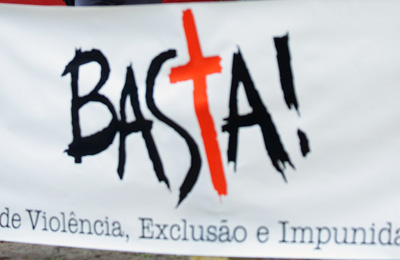Brazil restates commitment to press freedom, UN plan
CPJ has received an encouraging letter from Ambassador Maria Luiza Ribeiro Viotti, Brazil’s permanent representative to the United Nations, affirming the country’s support for the UNESCO-led U.N. Plan of Action for Security of Journalists and the Issue of Impunity.
Gunmen attack Brazilian journalist’s house, car at night
New York, May 1, 2012–Brazilian authorities must immediately investigate an attack on a radio journalist’s home on Saturday and ensure the perpetrators are brought to justice, the Committee to Protect Journalists said today. Vinícius Henriques and his family were asleep during the attack, and no one was injured, according to news reports.

Brazilian journalist Décio Sá assassinated
New York, April 24, 2012–Brazilian political journalist and blogger Décio Sá was shot and killed Monday night in the city of Sao Luis in northeastern Brazil, according to news reports. The journalist was sitting in a bar waiting for a friend when an unidentified man entered, walked to the bathroom, and shot Sá six times…
Brazil must be leader on impunity, free expression
Dear President Rousseff: We are writing to bring to your attention recent actions taken by the Brazilian government that contradict your expressed commitment to guarantee freedom of expression and make human rights a priority in the country. While we recognize that the Brazilian authorities have made strides in bringing journalist killers to justice in recent years, we ask that you assert global leadership to ensure that the fundamental right of freedom of expression is afforded to all.
Video: Getting Away With Murder
CPJ’s María Salazar-Ferro names the 12 countries where journalists are murdered regularly and governments fail to solve the crimes. Where are leaders failing to uphold the law? Where are conditions getting better? And where is free expression in danger? (4:46) Read CPJ’s 2012 Impunity Index. And visit our Global Campaign Against Impunity and see how…

Brazil, Pakistan, India fail test on journalist murders
Brazil, Pakistan, and India–three nations with high numbers of unsolved journalist murders–failed an important test last month in fighting the scourge of impunity. Delegates from the three countries took the lead in raising objections to a U.N. plan that would strengthen international efforts to combat deadly anti-press violence.

Attacks on the Press in 2011: Regulating the Internet
Legislation for Internet security can quickly turn into a weapon against the free press. Cybercrime laws are intended to extend existing penal codes to the online world, but they can easily be broadened to criminalize standard journalistic practices. By Danny O’Brien
Attacks on the Press in 2011: Brazil
In provincial areas where law enforcement is weak, reporters were vulnerable to attack for their coverage of corruption. In urban centers, journalists faced risks while covering organized crime and drug trafficking. Two journalists were killed in direct relation to their work in 2011, and CPJ was investigating the circumstances in four other killings. The uptick…